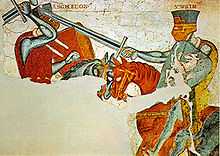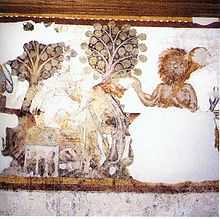Iwein

Iwein is a Middle High German verse romance by the poet Hartmann von Aue, written around 1203.[1] An Arthurian tale freely adapted from Chrétien de Troyes' Old French Yvain, the Knight of the Lion, it tells the story of Iwein (Ywain), a knight of King Arthur's Round Table. It was written after Hartmann's Erec, and may have been his last work.[1]
Iwein's Position in Hartmann's Work
Hartmann von Aue, because of his novel Erec, written around 1180, is considered the founder of German Arthurian Legend.
Iwein is his second courtly novel; on the basis of stylistic evidence, it is considered to be the last of Hartmann's total of four works. Between Erec and Iwein he created his two legendary stories Gregorius and Der arme Heinrich. Iwein must have been produced by 1205, as Wolfram von Eschenbach makes mention of it in his Parzival. The earliest possible creation date is usually taken to be the year 1190. Linguistic investigations seem to suggest that Iwein was begun shortly after Erec, but that Hartmann's work on it was interrupted after approximately 1000 verses. It is possible this is the result of the death of the patron. According to this theory, Hartmann only finished the poem at a later date. It is not known who commissioned Iwein, but the Zähringer, the Staufer and the Welfen have all been considered as possible patrons.
Like all Hartmann's works and courtly epics in general, Iwein is written in four-footed rhyming couplets.
Material and Sources
Hartmann's immediate source was the Old French epic Yvain, le Chevalier au Lion by Chrétien de Troyes, which was created either around 1177 or between 1185 and 1188. In contrast to his rather free version of Erec, Hartmann's translation of Iwein remains much closer to the French original. As the themes of the courtly epic had in the meantime become common knowledge for his German listeners, he was able to avoid lengthy explanatory digressions.
The subject matter of King Arthur belongs to the Matter of Britain, originally orally transmitted Celtic materials, which found entry to European literature through Chrétiens' reworkings.
Plot
Prologue
As is normal for medieval epics, Hartmann begins the tale with a Prologue (V. 1-85)- This contains a reference to the literary genre of Arthurian epics and programmatic statements about the morality of the poetry. Arthur is praised as an example of chivalry whose name is eternal. Hartmann adds a self-proclamation, which is written in much the same way as in Der arme Heinrich:
|
A knight, he was learned |
- (Hartmann von Aue: Iwein, V. 21-30. G.F. Benecke, K. Lachmann, L. Wolf. Übersetzt von Thomas Cramer. Berlin, New York ³1981)
First plot cycle

The novel begins with a Whitsun celebration at the court of Arthur, the epitome of courtly festivities. While there, Iwein hears the story of the Knight Kalogrenant, which is structured by Hartmann as a sort of novel in the novel. Kalogrenant reports how he happened across a clearing full of wild beasts on his way from a hospitable castle. In the middle of these beasts had stood a giant, ugly and uncultivated wild man, who nevertheless revealed himself to be not a brute or a fiend, but a peaceful herdsman. Kalogrenant's attempt to figure out the secret of an idyllic magical spring in the woods, of which the wild man informed him, failed utterly, however. Watering of a stone, he unleashed a powerful thunderstorm, which caused Askalon, the territorial Lord and protector of the spring to appear to defend it. Kalogrenant was defeated, and had to return home without horse or armor.
The misbegotten adventure of the Arthurian knight Kalogrenant gives the court of Arthur a legitimate challenge - that of avenging the dishonour. Iwein, who as a relation of Kalogrenant's is doubly hit by the scandal, rides ahead of a procession of the entire court and heads secretly into the Well-Kingdom. The adventure repeats itself, but with deadly consequences for Askalon. Iwein chases the mortally wounded, fleeing Askalon into his castle. The falling portcullis cuts Iwein's horse in two; though he himself remains uninjured, he is sealed in the gatehouse.
Only with the help of Lunete, the confidante of the mistress of the castle, Laudine, does Iwein succeed in escaping the castle guards. Out of thankfulness for earlier assistance at the court of Arthur he receives from Lunete a ring which makes him invisible. The dead Askalon is mourned by his beautiful wife Laudine. Iwein sees the castle-mistress through a window and becomes inflamed with love (Minne) for her.
The wounds of the dead man begin to bleed again, due to the presence of the killer, and thus a burlesque search for the invisible man begins. Once again Lunete solves the paradoxical situation and convinces Laudine that the victor over Askalon would be a worthy successor as husband, Lord of the land and protector of the fountain. In a comedic enactment (as all the parties are already aware of the intentions of the other) Iwein and Laudine come together under the mediation of Lunete. Soon thereafter the wedding is celebrated.
Then the court of Arthur arrives at the source, and Iwein must try out his role as fountain-protector for the first time. This succeeds against Keie, the exemplarily resentful knight of the court of Arthur. The entire court now celebrate the marriage of Iwein and Laudine. Thereby the plot arrives at a temporary ending - as well as the êre of victory Iwein has, unlooked for, achieved a wife and Lordship.
Iwein's breakdown and madness
On the urging of his friend Gawain, who uses the verligen (long-term idleness) of Erec as an example, Iwein leaves Laudine shortly after the wedding, and goes in search of Tournaments and âventiure. Laudine extracts from Iwein a promise to return after a year and a day. This timeframe implies a legally effective deadline after which his claims against possible usurpers would have lapsed. (This knowledge is left to the reader, and is not made explicit in the text).
The painful parting of the lovers is characterised by Minneharmonie. In a dialogue between the narrator and Lady Love it is stated that Iwein and Laudine have swapped their hearts, which will lead to momentous consequences.
Iwein gives himself up to the excitement of tournaments and notices only too late that he had already missed the pre-appointed deadline by six weeks. Lunete sues him before the Round Table for betrayal and takes the ring from him. All his honor is lost in Arthur's court and Laudine breaks off all connections with him. Thus Iwein loses his identity. Gripped by madness he rips the clothes from his body and becomes a wild man in the woods. His only social attachment is a silent exchange agreement with a hermit. Only through the help of the Lady of Narison and her companion, who treat his madness with a fairy-salve, can Iwein return to proper consciousness. His earlier identity as a knight seems to him as a dream. He must recognise that he no longer belongs to courtly society
Second plot cycle
Iwein frees the land of the Lady of Narison from Count Aliers, who has asserted a claim to it. The lady and the people wish him to become their sovereign, but he does not want this and hurries away. In the course of the story, he twice more rejects a marriage out of loyalty to Laudine.
Iwein rescues a lion from a dragon. From now on, the lion remains faithfully at his side, giving Iwein a new identity, the Knight of the Lion.
Chance brings him back to the spring, where the memory of his loss causes him to faint and fall from his horse. Iwein is on the verge of losing his mind again. Then he finds Lunete at the spring; because of her role in the marriage and Iwein's faithlessness (untriuwe), she has been sentenced to death. The only means of proving her innocence is trial by combat, and the deadline is the following day. Iwein acknowledges his guilt and assures Lunete that he will fight for her.
Immediately thereafter, however, he also commits himself to assisting his host in the fight against the giant Harpin the following morning. With the lion's help, he is able to overcome this scheduling conflict by defeating the giant in time to also be able to successfully fight for Lunete. Her accusers undergo the same punishment that was intended for her: they are burned at the stake. Laudine, who does not recognize the Knight of the Lion in his new identity, learns during this episode that the knight has lost the favor of a lady, and condemns it—unaware that she herself is the lady.
Since their relationship is still unresolved, Iwein again leaves Laudine. He then undertakes to defend the younger daughter of the Count of the Black Thorn in a conflict with her sister concerning their inheritance. With the girl, Iwein sets out for Castle Maladventure, where he must fight two giants in order to free three hundred noble ladies who are held captive in a workhouse.
After that, he rides with his companion to King Arthur's court, where a trial by combat is decreed. Iwein's friend, the exemplary Arthurian knight Sir Gawain, has declared himself the champion of the other sister. Without either knowing who the other is, Gawain and Iwein fight; neither is able to seal the victory. Only after darkness has fallen and the battle has been discontinued until the following day do they recognize each other while talking. King Arthur poses a trick question to the older sister, which causes her to betray herself, and grants the younger sister's claim. Iwein then reveals his identity and is joyfully welcomed back to the fellowship of the Round Table.
Although Iwein has gained great honor, he is sure that he will die of a broken heart. Once more in the guise of the Knight of the Lion, he returns to Laudine's court. However, he wins her back only after a comic intrigue on the part of Lunete: Laudine swears an oath to aid the Knight of the Lion who watered the stone at the spring in regaining his lady's favor. With that she must forgive Iwein, who expresses his deep regret and promises never again to risk losing her favor. The two renew their marriage and their love.
References
External links
- Iwein at the Hartmann von Aue Knowledgebase